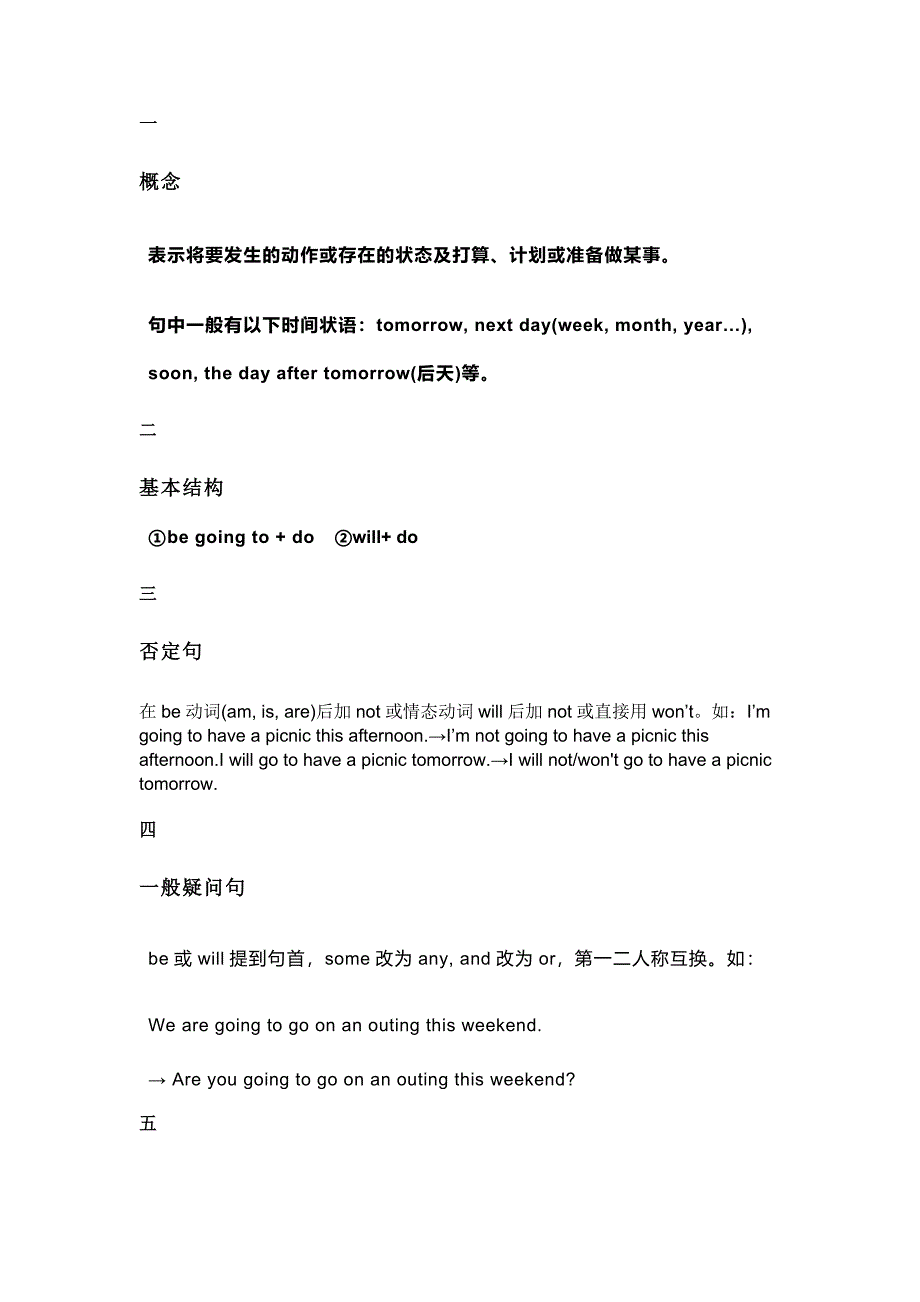《小學(xué)英語(yǔ)語(yǔ)法專(zhuān)題一般將來(lái)時(shí)講解和練習(xí)》由會(huì)員分享���,可在線閱讀����,更多相關(guān)《小學(xué)英語(yǔ)語(yǔ)法專(zhuān)題一般將來(lái)時(shí)講解和練習(xí)(6頁(yè)珍藏版)》請(qǐng)?jiān)谘b配圖網(wǎng)上搜索����。
1、一
概念
表示將要發(fā)生的動(dòng)作或存在的狀態(tài)及打算�、計(jì)劃或準(zhǔn)備做某事。
句中一般有以下時(shí)間狀語(yǔ):tomorrow, next day(week, month, year…), soon, the day after tomorrow(后天)等���。
二
基本結(jié)構(gòu)
①be going to + do ②will+ do
三
否定句
在be動(dòng)詞(am, is, are)后加not或情態(tài)動(dòng)詞will后加not或直接用won’t��。如:I’m going to have a picnic this afternoon.→I’m not going to have a picnic th
2�、is afternoon.I will go to have a picnic tomorrow.→I will not/won't go to have a picnic tomorrow.
四
一般疑問(wèn)句
be或will提到句首���,some改為any, and改為or����,第一二人稱(chēng)互換��。如:
We are going to go on an outing this weekend.
→ Are you going to go on an outing this weekend?
五
對(duì)劃線部分提問(wèn)���。一般情況下����,一般將來(lái)時(shí)的對(duì)劃線部分有三種情況�����。
1. 問(wèn)人�。Who 如:
I’
3、m going to New York soon.
→Who’s going to New York soon?
2. 問(wèn)干什么�。What 如:
My father is going to watch a race with me this afternoon.
→What is your father going to do with you this afternoon?
3. 問(wèn)什么時(shí)候。When 如:
She’s going to go to bed at nine.
→When is she going to bed?
六
同義句
be going to =
4��、will 如:
I am going to go swimming tomorrow.
= I will go swimming tomorrow.
練習(xí):
一�����、填空���。
1. 我打算明天和朋友去野炊��。
I _______ _______ _______ have a picnic with my friends.
I _______ have a picnic with my friends.
2. ——下個(gè)星期一你打算去干嘛??
——我想去打籃球����。
——What _______ _______ _______ _______ _______ next Monday??
5、——I _______ _______ _______ play basketball.
——What _______ you do next Monday?
—— I _______ play basketball.
3. ——你媽媽這個(gè)周末去購(gòu)物嗎?——是�,她要去買(mǎi)一些水果。
——_______ your mother _______ _______ go shopping this _______?
——Yes, she _______ . She _______ _______ _______ buy some fruit.
4. 你們打算什么時(shí)候見(jiàn)面��。
What t
6��、ime _______ you _______ _______ meet?
二�����、按要求做題��。
5. Nancy is going to go camping.(改否定)
Nancy _______ going to go camping.
6. I’ll go and join them.(改否定)
I _______ go _______ join them.
7. I’m going to get up at 6:30 tomorrow.(改一般疑問(wèn)句)
_______ _______ _______ to get up at 6:30 tomorrow?
8. We wi
7���、ll meet at the bus stop at 10:30.(改一般疑問(wèn)句)
_______ _______ meet at the bus stop at 10:30?
9. She is going to(listen to music) after school.(對(duì)括號(hào)內(nèi)部分提問(wèn))
_______ _______ she _______ _______ _______ after school?
10. (My father ) is going to see a play the day after tomorrow.(對(duì)括號(hào)內(nèi)部分提問(wèn))
_______ ______
8���、_ going to see a play the day after tomorrow?
參考答案:
一、填空����。
1. 我打算明天和朋友去野炊。
I?am going to?have a picnic with my friends.
I will?have a picnic with my friends.
2. ——下個(gè)星期一你打算去干嘛??
——我想去打籃球���。
——What are you? going_ to? do? next Monday??
——I? am? going to? play basketball.
——What? will? you do ne
9��、xt Monday?
—— I? will? play basketball.
3. ——你媽媽這個(gè)周末去購(gòu)物嗎?——是��,她要去買(mǎi)一些水果�����。
——Is?your mother going? to go shopping this weenked ?
——Yes, she is?. She is? going? to?buy some fruit.
4. 你們打算什么時(shí)候見(jiàn)面����。
What time? are? you? going? ?to???meet?
二��、按要求做題��。
5. Nancy is going to go camping.(改否定)
Nancy? isn't?
10�����、going to go camping.
6. I’ll go and join them.(改否定)
I? won't? go or?join them.
7. I’m going to get up at 6:30 tomorrow.(改一般疑問(wèn)句)
Are? you? going? to get up at 6:30 tomorrow?
8. We will meet at the bus stop at 10:30.(改一般疑問(wèn)句)
Will? you? meet at the bus stop at 10:30?
9. She is going to(listen to music) after school.(對(duì)括號(hào)內(nèi)部分提問(wèn))
What? is? she? going? to do? after school?
10. (My father ) is going to see a play the day after tomorrow.(對(duì)括號(hào)內(nèi)部分提問(wèn))
Who is? going to see a play the day after tomorrow?
 小學(xué)英語(yǔ)語(yǔ)法專(zhuān)題一般將來(lái)時(shí)講解和練習(xí)
小學(xué)英語(yǔ)語(yǔ)法專(zhuān)題一般將來(lái)時(shí)講解和練習(xí)

